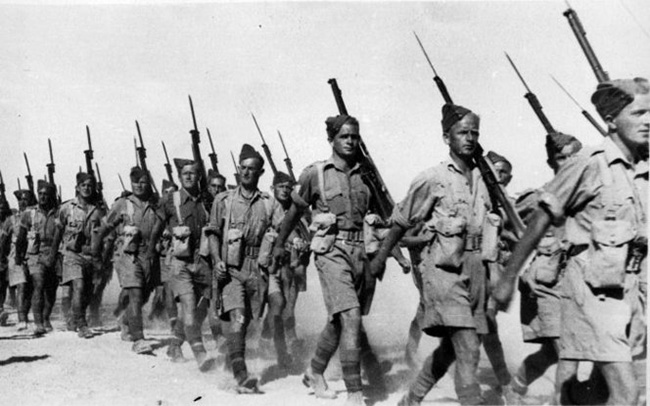 Friday 8 March 2019 9:08am
Friday 8 March 2019 9:08am
20th Battalion infantry marching in Baggush, Egypt, September 1941.
Kiwi men who were veterans of World War II appear to have had a shorter lifespan than other New Zealand men who were born at the same time, new research shows.
A study published today in the New Zealand Medical Journal estimates the war typically took five years off the lives of veterans, with former soldiers dying at an average age of 68 instead of 73.
The lead author of the study, Professor Nick Wilson of the University of Otago, Wellington, says the results are in line with previous international studies which found WWII veterans had shorter lifespans.
“This was particularly the case for those who were prisoners of war and often experienced severe malnutrition. But some war wounds could also have resulted in premature death, along with the impact of post-traumatic stress disorder.”
The situation is less clear cut than it may appear, however. Professor Wilson says some international studies have not recorded the same drop in life expectancy, something he attributes to the 'healthy soldier effect'.
“This effect arises from healthier men being selected into the military to start with – and with less healthy men being rejected at the recruitment stage.”
Professor Wilson warns the results of the latest study are preliminary as they are based on data from only 702 veterans, all of them buried in one large New Zealand cemetery.
“It is possible that these men, who were buried in the Taita Lawn Cemetery in Lower Hutt, were not typical of all New Zealand veterans. That is, if they had been disproportionately from lower socio-economic groups, then some reduced lifespan in this group might have been expected regardless of war participation. Nevertheless, from what we know of the socio-economic makeup of the Hutt Valley population, we think that any such effect may be small.”
A co-author of the study, Professor Glyn Harper from Massey University, says there is a need for a much larger study covering WWII veterans from all over New Zealand.
“New Zealand society needs to fully understand all the dimensions of one of the most important events in New Zealand's history and of the 20th century.”
Professor Harper says the initial findings from the study are not surprising given that previous New Zealand research has found a high level of long-term health problems in World War II veterans.
Indeed, the 1995 book Silent Casualties – New Zealand's Unspoken Legacy of the Second World War by journalist Alison Parr, reports that many WWII veterans “came home with invisible wounds”.
Parr notes that in 1985 more than 10,000 veterans were officially recognised as suffering from “nervous system disabilities”, including cases of post-traumatic stress disorder and alcohol abuse.
Official data shows that in 1946 there were 22,846 WWII veterans receiving war pensions for service-related disabilities. In the 1945-1946 year the New Zealand Government spent £58,302 on the medical treatment of war pensioners.
While this is the first New Zealand study to look at the lifespan of World War II veterans, a previous study by the same researchers found veterans of World War I also typically had their lives cut short. The WWI veterans were also found to be suffering long-term health problems associated with their war wounds - and from post-traumatic stress disorder.
Professor Wilson says that although there are still some WWII veterans alive, their deaths in future are unlikely to have much impact on the results of this type of study, as there are so few of them. For instance, if a man joined in the last year of the war in 1945 at the youngest possible age of 18 (born in 1927) he would be 92 years old in 2019.
Publication details:
Wilson, N. and G. Harper (2018). Lifespan of New Zealand Second World War veterans from one large cemetery: The case for a national-level study. New Zealand Medical Journal, 132(1491).
To receive a copy (PDF version), please email nick.wilson@otago.ac.nz
For further information, contact:
Professor Nick Wilson
Department of Public Health
University of Otago, Wellington
Email nick.wilson@otago.ac.nz
Professor Glyn Harper
School of Humanities
Massey University, Palmerston North
Email g.j.harper@massey.ac.nz
Cheryl Norrie
Communications Adviser
University of Otago, Wellington
Mob +64 21 249 6787
Email cheryl.norrie@otago.ac.nz
FIND an Otago Expert
Use our Media Expertise Database to find an Otago researcher for media comment.